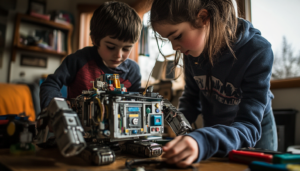I still hear it nearly every week; “I can’t homeschool because I’m afraid my child will fall behind.”
The fear that homeschooling might cause a child to fall behind is a common concern, yet it’s one that can be swiftly dispelled with the right approach and mindset. That’s why I advocate so heavily for new homeschool and homeschool ‘curious’ parents to adopt a premium home education mindset.

It is not about cutting and pasting random ideas found on social media into your own family lifestyle. There are so many perspectives, that by the time you’ve figured out your homeschool method on your own, your child will be grown.
The Premier Home Education mindset offers a strategy and support system. It addresses not only the flexibility to cater to individual learning needs and parenting styles, but also the opportunity to excel beyond traditional educational boundaries.
A Success Story: From Struggle to Triumph
Let me share a story about a student who faced significant challenges during his first three years of high school. With a sick parent at home, his academic performance suffered, and he ended up with a 1.7 GPA. But everything changed when he transitioned to a relaxed homeschool environment with a dedicated tutor. Within just four months, he made up four years’ worth of schoolwork.

Yes, FOUR MONTHS.
This remarkable transformation was fueled by an atmosphere that removed stress from learning and provided the mentorship support he needed.
In case you’re wondering about the legitimacy of his achievements, this student went on to score a 34 on the ACT—a testament to his true potential when nurtured in the right setting. He received a scholarship from Tennessee Tech and graduated as an engineer, starting his career with an impressive $86K salary.
His unique and redemptive journey illustrates that no college or athletic league truly concerns itself with accreditation, nor can they discriminate based on it. In fact, accredited courses today can be more easily passed than the transparent means many homeschoolers use to prove credits for college and career readiness.
The Importance of Addressing Insecurities
For parents worried about hindering their child’s progress, it’s crucial to address these insecurities head-on. Whether you choose to homeschool or not, your child will sense your uncertainty, and it may influence every decision you make—or avoid making.
Consider the ramifications of fearing that your child might fall behind: the potential costs in time, energy, money, and social embarrassment are significant. Instead, choose to step into the role of Academic CEO for your child’s education. Adopting a Premier Home Education mindset will naturally follow.
Accessing Support and Embracing Neuroeducation
Today, access to educational support is more widespread than ever before. There are few legitimate limitations for those who understand the long-term costs of delaying decisions. What I personally witnessed as methods that worked for families two decades ago—when resources were scarcer—can work even better now with today’s resources at your fingertips.
Neuroeducation research supports the idea that personalized learning environments, like those offered in homeschooling, tap into the brain’s natural plasticity. By removing stressors and tailoring education to individual needs, students can unlock their full potential and thrive. The relaxed atmosphere and individualized mentorship in our story allowed the student to re-engage with his studies, demonstrating how powerful these principles can be.
While I love, love, love leading workshops teaching my research blending neuroscience, environment, educational philosophies (and can instantly geek out on this); I’ll appeal to my right-brained parents with some key takeaways…
Neuroeducation Insights: Key Takeaways for a Premier Home Education
- Neuroplasticity and Personalized Learning:
- The brain’s ability to reorganize and form new neural connections, known as neuroplasticity, is enhanced in personalized learning environments like homeschooling. This adaptability allows students to develop competencies at their own pace, leading to deeper understanding and retention.
- Stress Reduction and Academic Performance:
- Research shows that reducing stress in the learning environment improves cognitive function and academic performance. A relaxed home education setting can help students focus better and absorb information more effectively. Even if you cannot envision your home as the best place, remember that ‘home education’ does not require the child sits at a desk in your physical home from 8am-3pm.
- Intrinsic Motivation and Engagement:
- Personalized education fosters intrinsic motivation, encouraging students to engage deeply with subjects they are passionate about. This internal drive enhances learning outcomes and supports long-term academic success.
- Flexible Learning Paths and Mastery:
- Homeschooling allows for flexible learning paths, enabling students to master subjects before moving on. This approach contrasts with traditional schooling’s rigid timelines and can lead to a stronger foundation of knowledge.
- Real-World Application and Brain Development:
- Integrating real-world experiences into education enriches learning and supports brain development. Hands-on activities and practical applications help students connect theoretical knowledge with everyday life.
- Mentorship and Cognitive Growth:
- Having access to mentors in a homeschool setting prov
- ides personalized guidance that supports cognitive growth. Mentors can tailor their teaching strategies to fit individual learning styles, enhancing comprehension and retention.
- Social-Emotional Learning (SEL) Integration:
- Homeschooling offers opportunities to integrate social-emotional learning (SEL), which is crucial for developing emotional intelligence. SEL fosters resilience, empathy, and effective communication skills.
- Adaptive Learning Technologies:
- Utilizing adaptive learning technologies in homeschooling can personalize education further, offering tailored resources that adjust to each student’s learning pace and style.
- Creative Problem-Solving Skills:
- A homeschool environment encourages creative problem-solving by allowing students the freedom to explore different solutions without the constraints of standardized curricula.
By incorporating these neuroeducation insights into your homeschool approach, you can create a rich, supportive learning environment that empowers students to reach their full potential.
Embracing a Premier Home Education Mindset
Remember, I can show you the ‘What’ and the ‘Why’ of Premier Home Education all day long. However, it will never serve for ‘Action’ and ‘Accountability’, which only comes through a customized blueprint.
Through initiatives like ATHENS Edu, we’re empowering parents to create personalized learning experiences that go beyond traditional schooling. A premier home education isn’t about replicating conventional methods—it’s about reimagining what education can be, embracing flexibility, creativity, and innovation.
So if you’re ready to take charge of your child’s educational journey and dispel any lingering myths about falling behind, remember: with the right mindset and resources, anything is possible. Let’s create an environment where our children can soar, equipped with the tools they need for lifelong success.









Leave a Reply